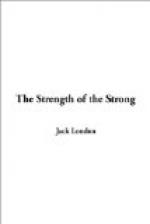“Messener’s very words,” Collins said. “And I, for one, am ready to submit, only they won’t give me a chance to submit. I haven’t had a full meal in an age. I wonder what horse-meat tastes like?”
We stopped to read another proclamation: “When we think our employers are ready to submit we shall open up the telegraphs and place the employers’ associations of the United States in communication. But only messages relating to peace terms shall be permitted over the wires.”
We rode on, crossed Market Street, and a little later were passing through the working-class district. Here the streets were not deserted. Leaning over the gates or standing in groups were the I.L.W. men. Happy, well-fed children were playing games, and stout housewives sat on the front steps gossiping. One and all cast amused glances at us. Little children ran after us, crying: “Hey, mister, ain’t you hungry?” And one woman, nursing a child at her breast, called to Dakon: “Say, Fatty, I’ll give you a meal for your skate—ham and potatoes, currant jelly, white bread, canned butter, and two cups of coffee.”
“Have you noticed, the last few days,” Hanover remarked to me, “that there’s not been a stray dog in the streets?”
I had noticed, but I had not thought about it before. It was high time to leave the unfortunate city. We at last managed to connect with the San Bruno Road, along which we headed south. I had a country place near Menlo, and it was our objective. But soon we began to discover that the country was worse off and far more dangerous than the city. There the soldiers and the I.L.W. kept order; but the country had been turned over to anarchy. Two hundred thousand people had fled from San Francisco, and we had countless evidences that their flight had been like that of an army of locusts.
They had swept everything clean. There had been robbery and fighting. Here and there we passed bodies by the roadside and saw the blackened ruins of farm-houses. The fences were down, and the crops had been trampled by the feet of a multitude. All the vegetable patches had been rooted up by the famished hordes. All the chickens and farm animals had been slaughtered. This was true of all the main roads that led out of San Francisco. Here and there, away from the roads, farmers had held their own with shotguns and revolvers, and were still holding their own. They warned us away and refused to parley with us. And all the destruction and violence had been done by the slum-dwellers and the upper classes. The I.L.W. men, with plentiful food supplies, remained quietly in their homes in the cities.




